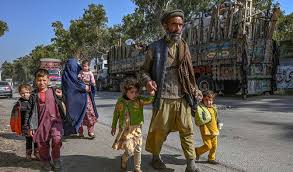KABUL (Khaama Press): The UN High Commissioner for Refugees office in South Asia has stated that it needs $620 million to protect and support Afghan migrants in Iran and Pakistan.
The organization said in a message on its social media platform X, on Friday, April 5th, that the situation in Afghanistan and neighbouring countries will be challenging in 2024.
According to the UNHCR report, 4.8 million Afghan migrants and 2.5 million members of their host communities will be assisted in 2024.
This entity stated that alongside the expulsion of Afghan migrants from Pakistan and Iran, devastating natural disasters, the crisis of climate change, and deadly earthquakes have worsened the situation in the country in 2022 and 2023. The UNHCR, referring to the urgent need for humanitarian assistance for 23.7 million people to survive, has described the human rights situation, especially the rights of women, girls, and religious and ethnic minorities, as dire. According to the report, Iran and Pakistan host around 7.7 million Afghan citizens, approximately 1.6 million of whom entered the country since 2021.
Meanwhile, Amnesty International and some human rights organizations have expressed concern about the continuation of the process of expelling Afghan migrants from Pakistan and demanded a halt to this trend.
According to an Amnesty International official, “The plan to repatriate undocumented foreign nationals in Pakistan violates the rights of refugees and international human rights law, especially the principle of non-refoulement, endangering the lives of all Afghan refugees, especially women, girls, journalists, and human rights defenders.”
Since the forced deportation of Afghan refugees from Pakistan in November 2023, over half a million migrants have been repatriated to the country. However, they are facing several challenges amid a dire humanitarian crisis. Many returnees are struggling with the lack of basic amenities such as shelter, food, and healthcare, exacerbating their already precarious situation.







